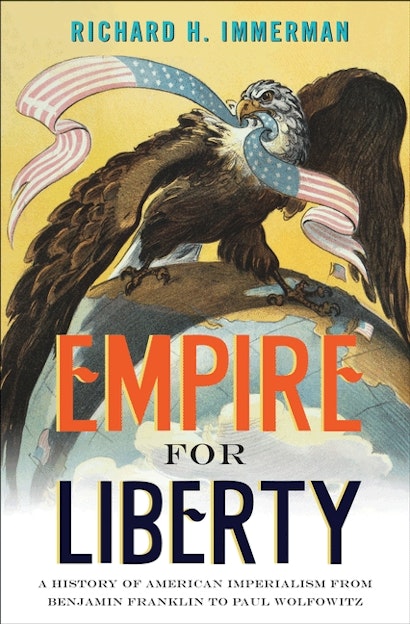How could the United States, a nation founded on the principles of liberty and equality, have produced Abu Ghraib, torture memos, Plamegate, and warrantless wiretaps? Did America set out to become an empire? And if so, how has it reconciled its imperialism—and in some cases, its crimes—with the idea of liberty so forcefully expressed in the Declaration of Independence? Empire for Liberty tells the story of men who used the rhetoric of liberty to further their imperial ambitions, and reveals that the quest for empire has guided the nation’s architects from the very beginning—and continues to do so today.
Historian Richard Immerman paints nuanced portraits of six exceptional public figures who manifestly influenced the course of American empire: Benjamin Franklin, John Quincy Adams, William Henry Seward, Henry Cabot Lodge, John Foster Dulles, and Paul Wolfowitz. Each played a pivotal role as empire builder and, with the exception of Adams, did so without occupying the presidency. Taking readers from the founding of the republic to the Global War on Terror, Immerman shows how each individual’s influence arose from a keen sensitivity to the concerns of his times; how the trajectory of American empire was relentless if not straight; and how these shrewd and powerful individuals shaped their rhetoric about liberty to suit their needs.
But as Immerman demonstrates in this timely and provocative book, liberty and empire were on a collision course. And in the Global War on Terror and the occupation of Iraq, they violently collided.
"The book makes a very compelling case that imperialism has always been a centerpiece of the American project. Its brisk and readable style makes it useful for courses at both the undergraduate and graduate levels."—Paul T. McCartney, Journal of American History
"Empire for Liberty deserves a wide audience of students, scholars, and even general readers. Immerman provides crucial, poorly understood background that helps place recent controversies in a broad context, and he offers fresh analysis of some of America's most colorful and complicated thinkers about America's place in the world."—Mark Atwood Lawrence, History Teacher
"Overall, Immerman has written one of the best descriptions and analyses of 'American empire'—its meaning, evolution, and key figures that have impacted the idea. Empire for Liberty is essential reading for students and enthusiasts of American history and the United States' place in and approach to the world, historically and contemporarily."—Stefan Fergus, Civilian Reader
"In this penetrating, lively account that introduces readers to diplomatic history in a most painless way, Immerman offers case studies of six public figures whose choices affected the ever-increasing power of the U.S."—Choice
"Immerman has produced a masterly if controversial conspectus that leads the reader far beyond the six men featured in the book."—Gill Bennett, RUSI Journal
"Empire for Liberty makes important contributions by demonstrating how U.S. efforts to expand its empire gradually pushed it farther from the East Coast and further from its constituting ideals. . . . Empire for Liberty puts a mirror in front of us, forcing us to accept the complexity of designing a moral foreign policy that still serves a national interest."—Barak Mendelsohn, Political Science Quarterly
"Given the directness, the clarity, and the analytical rigor with which Richard H. Immerman has assessed American imperialism, he obviously was not intimidated by the words, the concept, or U.S. imperial practices."—Joseph A. Fry, Marine Corps University Journal
"Empire for Liberty should be mandatory reading for anyone seeking to better understand how and why notions of empire and liberty drove the American experience, and the extent to which this nexus remains central to understanding contemporary US engagement with the rest of the world."—Andrew L. Johns, Canadian Journal of History
"This book is a welcome addition to the growing body of scholarly work that grapples with the notion of America as an empire. . . . [T]he essays in this book well repay reading by anyone who wonders about the big questions that swirl around America's rise to global prominence."—Frank Ninkovich, Historian
"Empire for Liberty places both the theory and the practice of empire inside history. Richard Immerman's complex, ironic account of the American empire and its relation to the concept of liberty is an essential analysis of how the United States became the kind of power it is today and where it might now be going."—Marilyn B. Young, New York University
"Immerman, one of the most accomplished and distinguished historians of twentieth-century U.S. foreign relations, tackles a subject of enormous importance. This short book fills a vacuum by presenting a brisk but analytically challenging synthesis through the lives of six individuals who played pivotal roles in the growth, evolution, and maturation of the American empire."—Robert J. McMahon, author of The Limits of Empire: The United States and Southeast Asia since World War II
"Game over. With the appearance of Richard Immerman's brilliantly conceived and incisive book, the post-9/11 competition to map the origins, evolution, and present-day afflictions of the American empire has ended. Empire for Liberty sweeps the field."—Andrew J. Bacevich, author of The Limits of Power: The End of American Exceptionalism
"This is a superb book about a timely subject. Immerman tackles the idea of empire, a concept that Americans have preferred not to talk about and historians have shied away from. Given the importance of the topic and the ongoing debate over the future of U.S. foreign policy, this book should attract a readership beyond academia."—George C. Herring, author of From Colony to Superpower: U.S. Foreign Relations since 1776
"Forceful, engaging, and provocative. Immerman makes a significant contribution to American history by synthesizing the ways representative policymakers have conceived of the question of American empire. Empire for Liberty will be a well-read and important book."—Jeffrey A. Engel, editor of The China Diary of George H. W. Bush


